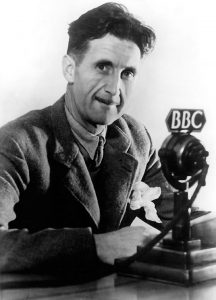It was a bright cold day in April, and the clocks were striking thirteen.
Opening line, Nineteen Eighty-Four, George Orwell, 1949
From the last word of the first line, Orwell has us in his hands with not just one clock but all clocks striking thirteen.
I thought about Nineteen Eighty-Four when writing my last post about books discarded by libraries. One of the excuses given by library administrators is the digitisation of books, the physical copies of which can then be sold or given away or thrown into landfill. The trouble is that digitised writing can be altered permanently with quick and simple keystrokes, and if the only printed copy is dead and buried, there’s no way of knowing exactly what its author wrote.
Therein lies the connection with Nineteen Eighty-Four. One of its creepy elements was Winston’s job as a falsifier of records, altering newspapers and books and “every kind of literature or documentation which might conceivably hold any political or ideological significance.” As soon as he had completed the corrections requested for an issue of the newspaper, that issue “would be reprinted, the original copy destroyed, and the corrected copy placed on the files in its stead.”
Is it any different from a handwritten manuscript that hundreds of years ago was copied by monks many times over, and where, like Chinese whispers, the content could change slightly with every new version? Diligent scholars who spent their days copying books might also have slipped in an opinion, misquoted a speech, altered figures. If they did, we’ll never know, in the same way that we’ll never know whether digitised books are an exact copy if the originals are destroyed to make space for computers.
Still, much as I scream NO to book-dumping, I see the logic in digitisation if only there could always be at least one printed copy left somewhere in the world.

George Orwell (born Eric Arthur
Blair), 1903-1950, photo courtesy Penguin Books India
Orwell’s opening line was recommended by a fellow blogger: http://www.anevolvingscientist.org/
Thanks!
*
